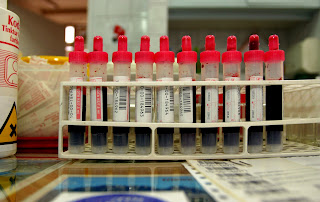Wednesday, September 21, 2011
Is Your Doctor Ordering the Right Labwork?
Do not be afraid! I paraphrased the chemistry as much as possible and if I can get it, you can too! This article explains why your doctor may not be ordering the right tests for your thyroid.
The standard lab tests for thyroid function measure TSH (thyroid stimulating hormone) and T4 (thyroxine). TSH is a hormone made by the pituitary gland in the brain and this hormone manages how your thyroid functions. Really high levels of TSH along with low levels of T4 means your thyroid isn't working well, in other words hypothyroidism.
T4 is a hormone your thyroid makes to manage your metabolosim. However, it must be converted to another hormone, T3, in order for your body to use it. It is possible to have normal T4 levels and yet to have low levels of T3. This means you will still have hypothyroid symptoms even though your labs are "normal".
Another test your doctor may not use is how much active also known as free T4 and T3 are circulating in your body. Most doctors only test the total levels of T4 and T3. Most thyroid hormones in your body are attached to proteins. This means they are not doing anything useful for you. Only a very small amount are free, meaning they are not attached to anything else. These free thyroid hormones are what your body uses. This means a test for your total T4 and T3 may look normal when in fact there is not enough active hormone for your body to function well.
So, your doctor is likely not ordering enough blood tests to get the complete picture of how your thyroid is really working. See how open your doctor is to looking at your levels of T3, as well as your levels of free T3 and T4. These tests could explain why you still have hypothyroid symptoms and prove that it isn't "just in your head."
If you'd like to learn more about the thyroid and how it works, follow these links.
Wikipedia
Endocrineweb
Dearthyroid
Subscribe to:
Post Comments (Atom)
Related Posts
loading..

No comments:
Post a Comment